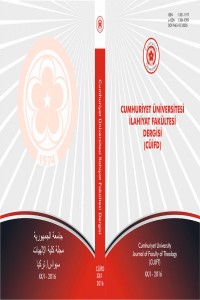Abstract
The History of Religions shows us that all the religions and the belief systems of the world
have seperated into various groups and sects. Moreover, sametimes these groups or sects
carry the characters which were not aimed by its establishers or prominent leaders. Both
the basic structure of religious system and exterior factors are activ in this phenomen. The
fact that Christianity has divided into much more sects in comparison to Islam and Judaism
can be explained with the opennes of its basic concepts too many speculations. aeginning
from its first century with the Jeadership of St. Paul, Christiariity splitted very fastly in Roman
Empire but from the other side targeted by various'interpretations of it adherents. The
Paulidans are one of the most effective and important heresies of Church History. The aim
of this article ls to investigate the theloglcal roots of Paulidan Heresy which caused many
religious and political turbulances in Eastern provinces of Bzyantine Empire and managed to
draw the attentlons of rellgious and political powers within the light of existlng sources and
researchs.
References
- Nina G.Garsoian, 'Paulicians' Dictionary of the Midelle Age s IX., s. 468; Ahmet Gökbel,
- Inanc Tarihi Açısından Sivas, Kitabevi, İstanbul, 2004, s. 65
- Milan Laos, Düalist Heresy in the Middle Ages, Prague, s. 32; Paul J. Alexander,
- "Religious Persecution and Resistance in the Byzaptine Empire of the Eight end Ninth
- Centurie: Methods and Justifications", Religious and Political History and Thought in
- the Byzantine Empire. Collected Studies, V ariorum reprints, London, 1978, 238-2364,
- s. 239
- C. A. Scott, "Paıılicians", Encyclopedia of Religion and Ethics, IX.,1980, Edinburg., s.
- 696
Abstract
Dinler Tarihi bize yeryüzünde varlık sürdürmüş bütun dinlerin ve inanç sistemlerinin çeşitli
gruplara, mezheplere, hatta kuruculannın da amaçlamadığı farklı kimliklere büründüğünü
göstermektedir. Kimi zaman bu durum söz konusu inanç sisteminin temel yapısından kaynaklandığı
gibi, kimi zaman da dış faktörler etkin rol oynarlar. Hıristiyan dininin tarihi süreç
içerisinde diğer iki büyük semavi din olan islam ve Museviliğe kıyasla daha fazla alt oluşum
ve mezheplere aynlmasında, onun spekülasyonlara açık çok sayıda teolojik temel kavramlara
sahip olmasının önemli rol oynadığı düşünülebilir. Tartışmalar ve ilk aynimalann temelinde
İsa'nın konumu, diğer bir ifade ile kristoloji meselesi yatmaktadır. Daha ilk yüzyılından
başlayarak Aziz Paul'un yönlendirdiği bu din, kısa zamanda hem genişce yayılma Imkanı
bulmuş hem de mensuplan arasında çok farklı yorumlara sahne olmuştur. Bunun neticesinde
birçok ayniıçı grubun açılar arasında en etkili olanlardandır. Bu makalenin amacı Bizans
döneminde ciddi şekilde etkili olan ve hem siyasi hem de dini kimlikleri ile oteritelerin dikkatlerini
üstüne çeken bu mezhebin kökenierini mevcut kaynaklar ışığında araştırmaktır.
References
- Nina G.Garsoian, 'Paulicians' Dictionary of the Midelle Age s IX., s. 468; Ahmet Gökbel,
- Inanc Tarihi Açısından Sivas, Kitabevi, İstanbul, 2004, s. 65
- Milan Laos, Düalist Heresy in the Middle Ages, Prague, s. 32; Paul J. Alexander,
- "Religious Persecution and Resistance in the Byzaptine Empire of the Eight end Ninth
- Centurie: Methods and Justifications", Religious and Political History and Thought in
- the Byzantine Empire. Collected Studies, V ariorum reprints, London, 1978, 238-2364,
- s. 239
- C. A. Scott, "Paıılicians", Encyclopedia of Religion and Ethics, IX.,1980, Edinburg., s.
- 696
Details
| Journal Section | Peer-reviewed Research Articles |
|---|---|
| Authors | |
| Publication Date | December 15, 2010 |
| Published in Issue | Year 2010 Volume: 14 Issue: 2 |
CUIFD Creative Commons Atıf-Gayriticari-Türetilemez 4.0 Uluslararası Lisansı ile lisanslanmıştır.


